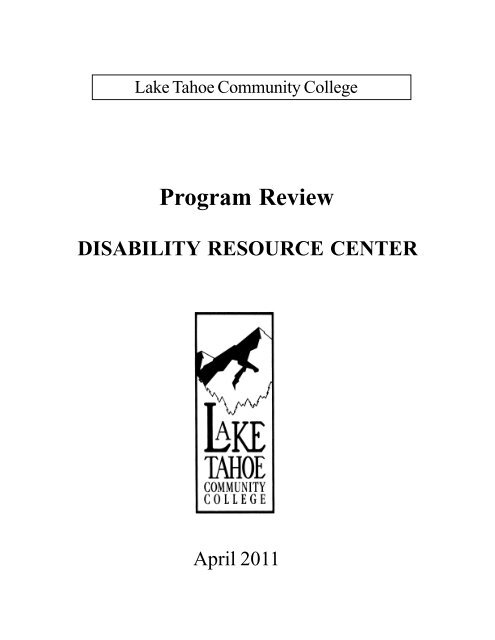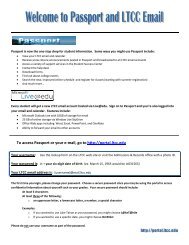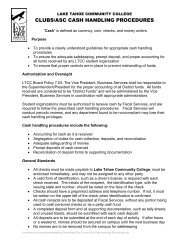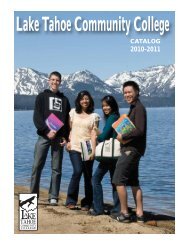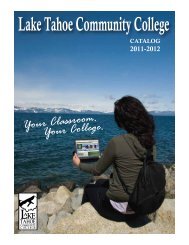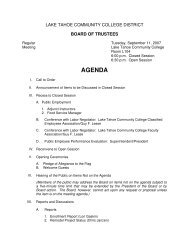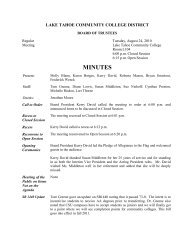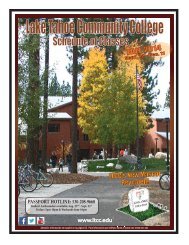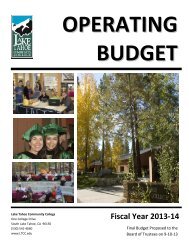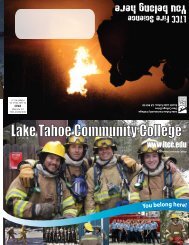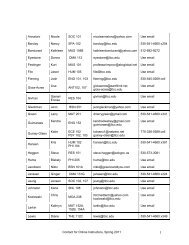DRC Program Review 2011.pdf - Lake Tahoe Community College
DRC Program Review 2011.pdf - Lake Tahoe Community College
DRC Program Review 2011.pdf - Lake Tahoe Community College
- No tags were found...
Create successful ePaper yourself
Turn your PDF publications into a flip-book with our unique Google optimized e-Paper software.
<strong>Lake</strong> <strong>Tahoe</strong> <strong>Community</strong> <strong>College</strong><br />
<strong>Program</strong> <strong>Review</strong><br />
DISABILITY RESOURCE CENTER<br />
April 2011
<strong>Lake</strong> <strong>Tahoe</strong> <strong>Community</strong> <strong>College</strong><br />
Disability Resource Center<br />
<strong>Program</strong> <strong>Review</strong><br />
April 2011<br />
Philosophy<br />
We believe:<br />
• All students have the potential for growth and success.<br />
• All students have the right to be treated with respect.<br />
• The diversity brought to the campus by students with disabilities enriches the<br />
overall college learning environment.<br />
• Education is a process of mutual responsibility in which students benefit by<br />
participating actively in meeting their educational goals.<br />
The diverse needs of students with disabilities are best met in an environment<br />
that (is):<br />
• Accessible, inclusive, and supportive.<br />
• Provides fair and consistent treatment.<br />
• Encourages independence and self-sufficiency.<br />
• Recognizes and respects each student’s unique challenges and strengths.<br />
Mission<br />
The mission of the Disability Resource Center (<strong>DRC</strong>) is to promote selfconfidence<br />
in an educational environment while fostering student independence.<br />
The staff of the <strong>DRC</strong> is committed to the establishment of a positive learning<br />
environment focusing on academic integrity, sensitivity to our students, creating a<br />
springboard for change and, ultimately, achievement of student success. At the<br />
<strong>DRC</strong>, our students come first, and their individual needs are the focal point to<br />
attaining these goals.<br />
19
Table of Contents<br />
Page(s)<br />
Philosophy 1<br />
Mission 1<br />
Section 1 - Executive Summary 3-4<br />
<strong>Program</strong> Goals and Objectives 3<br />
Budget Recommendations 3-4<br />
Section 2 - Introduction and <strong>Program</strong> History 4-10<br />
Development of <strong>Program</strong> 4<br />
FTE Faculty 4-6<br />
FTE Classified 6<br />
Curriculum 6-7<br />
Courses 7<br />
Challenges and Successes 7-8<br />
Student Counts 9<br />
Facilities 9<br />
Services 10<br />
Advisory Committee 10<br />
Section 3: <strong>Program</strong> Purpose and <strong>Program</strong> Student Learning Outcomes 10-12<br />
Section 4: <strong>Program</strong> Goals and Objectives 13-16<br />
Section 5: Final Budget Recommendations 16-17<br />
Appendix A: Annual DSPS Allocations 18-19<br />
Appendix B: Student Counts 20-21<br />
Appendix C: Advisory Committee Agendas Meeting and Minutes 22-40<br />
2
Section 1: Executive Summary<br />
In 2010/2011 the Disability Resource Center (<strong>DRC</strong>) completed the <strong>Program</strong><br />
<strong>Review</strong> that included close examination of services, usage, environment, and<br />
challenges. This resulted in recommendations to advance program development<br />
and success. The program review was completed by Bob Albrecht and Beth<br />
Marinelli-Laster, <strong>DRC</strong> Faculty.<br />
<strong>Program</strong> Goals and Objectives:<br />
Goal 1: Access – Ensure that the LTCC learning environment is accessible and<br />
welcoming to all students with disabilities.<br />
Goal 2: Proctoring – continue the transfer of proctoring services to the TLC. The<br />
consolidation of proctoring is more in line with <strong>DRC</strong> budget not supporting<br />
duplicated services.<br />
Goal 3: Technology – To provide comprehensive computer and media<br />
technologies that facilitate student learning.<br />
Goal 4: Services - To provide a wide range of support services for students with<br />
disabilities to ensure success, promote independence and facilitate academic<br />
achievement.<br />
Goal 5: Outreach/Inreach – Actively recruit students with disabilities throughout<br />
the college and community, and connect them to all campus services.<br />
Goal 6: Courses – Work toward inactivating GES142 and replacing it with a<br />
waitlist for LD Assessment.<br />
Budget Recommendations:<br />
Disabled Student <strong>Program</strong>s at <strong>Community</strong> <strong>College</strong>s throughout the state have<br />
experienced unprecedented budget cuts during the past two years and with the<br />
continuing budget crisis in the state of California the future remains unsettled at<br />
best. Because of these cuts the <strong>DRC</strong> has lost all classified positions and had<br />
faculty positions redefined and reduced. <strong>DRC</strong> allocations for the past seven<br />
years are reflected in Appendix A on page 18-19.<br />
Budget recommendations are divided into the five required categories (human<br />
resource needs, facilities needs, technology needs, materials/supplies needs,<br />
and professional development needs) which have been specifically linked to the<br />
program review goals/objectives.<br />
Human Resource needs must be addressed regarding the loss of FTE Faculty<br />
and Classified positions as well as reduced tutoring hours. Technology demands<br />
will continue to be an ongoing budgetary expense. The recent changes in<br />
LTCC’s materials and supplies ordering system has reduced <strong>DRC</strong> expenses in<br />
3
some areas while others are ongoing. Professional Development should be<br />
made available to all <strong>DRC</strong> personnel. For more complete budget<br />
recommendations see Section 5: Final Budget Recommendations on page 16-<br />
17.<br />
Section 2: Introduction and <strong>Program</strong> History<br />
The Disability Resource Center (<strong>DRC</strong>) is funded through categorical funds as<br />
specified by State of California Education Code. Funding received is based on a<br />
weighted scale for disabilities served. The <strong>DRC</strong> also receives general fund<br />
monies in the form of district match. Traditionally, the <strong>DRC</strong> budget has been<br />
maintained within the <strong>DRC</strong>, by the Director and under the direction of the Dean of<br />
Student Services.<br />
Historically the <strong>DRC</strong> has been self-supporting yet given recent unprecedented<br />
statewide budget cuts (48%) in the 2009/2010 academic years, LTCC has begun<br />
offsetting <strong>DRC</strong> expenses through the general fund. Discussions are currently<br />
underway as to how to continue to fund the <strong>DRC</strong> and provide needed services to<br />
students with disabilities.<br />
Development of <strong>Program</strong>:<br />
The <strong>DRC</strong> began operating in the late 1970’s as the Learning Lab on the original<br />
LTCC campus. Prior to the move to the existing campus in 1987, the Learning<br />
Lab was staffed entirely with part-time faculty and staff. The first full-time faculty<br />
was hired as an LD Specialist in the fall of 1988 and the second full-time position<br />
was the Director’s position, which was added in fall of 1991. During this time,<br />
and for the next few years, there was considerable movement within the faculty<br />
personnel. Since the first full time hirings in the Disabled Students <strong>Program</strong><br />
there have been eight different full-time LD Specialists, five different full-time<br />
Directors and at least three Interim Directors.<br />
FTE Faculty:<br />
The full-time <strong>DRC</strong> faculty has remained the same for the past 7 years with the<br />
Director in place since 2001, the LD Specialist since 2002, and the Counselor<br />
since 2004. It is the belief of the faculty that this consistency in staffing over the<br />
past several years has proven to be beneficial for <strong>DRC</strong> students. Historically<br />
there has been a full-time LD Specialist since the original hire. In the fall of 2010,<br />
the full-time LD Specialist was moved to 50% teaching general Psychology<br />
courses due to the current budget situation.<br />
4
The Counseling position originated in January of 2000 and has seen three<br />
different full-time counselors. Over the years it had been vacant for about five<br />
quarters with three different General Counselors filling in on a limited basis. It<br />
should be noted that the Counselor has continued to voluntarily reduce their load<br />
to 81% in order to help save costs during difficult budget times.<br />
Recently there has been a dramatic change in duties and workload for the three<br />
full-time faculty members. The following is a summary of some of the duties:<br />
* = new or increased duties<br />
<strong>DRC</strong> Director<br />
• Budget<br />
• MIS Reporting*<br />
• Alternate Media*<br />
• LD Assessment*<br />
• Scheduling and Proctoring*<br />
• Student Management System Maintenance*<br />
• SARS Maintenance*<br />
• Disability-Management Counseling<br />
• Teaching<br />
• Hiring and Supervision of Tutors and Interpreters<br />
The <strong>DRC</strong> Director has taken on the duties of the Alternate Media Specialist, not<br />
only in the production of alternate media but in the maintenance of adaptive<br />
software and all the software specific to <strong>DRC</strong> faculty. Many of the clerical duties<br />
of the <strong>DRC</strong> Assistant have also been absorbed by the Director including direct<br />
inputting of MIS data, keeping of timesheets for tutors and hourly interpreters,<br />
answering phones, and scheduling student appointments. The Director is also<br />
more involved in the Learning Disabilities Assessment process as the Learning<br />
Disabilities Specialist has been reduced to .50 FTE.<br />
LD Specialist<br />
• LD Assessment (50%)*<br />
• Managing GES 142<br />
• Scheduling and Proctoring*<br />
• Disability-Management Counseling<br />
• No longer teaching GES courses*<br />
• Reduced presence with <strong>DRC</strong> students*<br />
• Teaching Psychology (50%)*<br />
The Learning Disabilities Specialist has also absorbed some of the duties of the<br />
<strong>DRC</strong> Assistant in answering phones and scheduling student appointments. The<br />
Learning Disabilities Specialist, while reduced .50 FTE, is still coordinating<br />
assessment of students, with numbers at or above previous years’ levels. The<br />
loss of the part-time LD Specialist position has been absorbed largely by the LD<br />
5
Specialist in regards to extra assessment, scoring and calculating results of<br />
assessment, and learning strategies training. The LD Specialist also regularly<br />
works with students on writing across the curriculum, due to the fact that the<br />
<strong>DRC</strong> no longer employs writing tutors.<br />
<strong>DRC</strong> Counselor<br />
• LD Assessment*<br />
• Deaf Services Coordination<br />
• MIS Data Collection*<br />
• Academic Advising<br />
• Disability-Management Counseling<br />
• Scheduling and Proctoring*<br />
Academic advising and disability-management counseling continue to be the<br />
main focus of the <strong>DRC</strong> Counselor. The Counselor has also absorbed some of<br />
the duties of the <strong>DRC</strong> Assistant in answering phones and scheduling student<br />
appointments. Given our remote location and the low number of local<br />
interpreters, Deaf Services coordination is an increasingly difficult challenge.<br />
The Counselor is now assisting in MIS data collection and LD Assessment in a<br />
limited capacity. In June 2011, the Counselor will complete the LD Eligibility<br />
Model Training and be fully qualified in all aspects of LD Assessment. The<br />
Counselor continues to work at .81 FTE which, at this time, is not a burden on<br />
<strong>DRC</strong> staff. However, this reduced workload needs to be assessed annually<br />
given the ever-changing state of the budget.<br />
FTE Classified:<br />
Recent budget cuts have led to the elimination of all classified positions. This<br />
has been a tremendous challenge for Faculty to provide services necessary for<br />
student success. Prior to this, <strong>DRC</strong> classified staffing had been fairly consistent<br />
over the years. The first fulltime classified position in the DSP&S program,<br />
<strong>Program</strong> Assistant, began as a temporary position in February of 1992 and<br />
became permanent one year later. A part-time High Tech Aide position was filled<br />
in September 1994, with another added in September 1998. These positions<br />
remained in place until the spring of 2003 when they were eliminated due to<br />
budget constraints. In September of 2000, the Alternate Media Specialist<br />
position was created and filled by one of the High Tech Aides.<br />
Curriculum:<br />
General Education Courses (GES) are designed for student with special needs<br />
yet are open to all students attending LTCC. During the most recent Title V<br />
updating of GES courses, the cross-listing of courses with general courses was<br />
eliminated to alleviate student confusion. Repeatability was properly addressed<br />
6
in order to be aligned with current repeatability standards. Current Curriculum<br />
includes:<br />
• GES142 Learning Styles and Cognitive Development<br />
• GES193 Study Skills<br />
• GES199A Introduction to Basic Word Processing and Internet<br />
• GES551 Independent Living Skills<br />
Courses:<br />
Currently, GES142: Interpretation of Learning Styles and Cognitive Development,<br />
is under consideration of being inactivated for the 2011/2012 academic year.<br />
<strong>DRC</strong> Faculty has streamlined the assessment process and consequently the<br />
number of hours required for completion for the majority of students is less than<br />
the unit code for the course. A more efficient process for students would be<br />
utilizing a waitlist process that is currently being used by the majority of California<br />
<strong>Community</strong> <strong>College</strong>s.<br />
Challenges/Successes:<br />
The statewide budget crisis continues to be the greatest challenge to the <strong>DRC</strong> for<br />
the foreseeable future. In January 2009, with budget cuts looming, the <strong>DRC</strong><br />
Assistant position was reduced from full-time to part-time hourly. Then with<br />
unprecedented budget cuts in place for the 2009/2010 academic year, the <strong>DRC</strong><br />
Assistant position, Tutors, and the part-time LD Specialist position were all<br />
eliminated. Tutoring was then re-instated on a dramatically reduced scale in<br />
January 2010 and the <strong>DRC</strong> is continually reviewing staffing needs relative to<br />
future funding.<br />
Beginning in Fall quarter 2010 exam proctoring for <strong>DRC</strong> students was moved to<br />
the Tutoring and Learning Center (TLC) due to lack of testing space and no test<br />
proctors or classified staff in the <strong>DRC</strong>. This process required a lot of work by<br />
staff in both departments to facilitate this transition and a good faith effort was<br />
made by all involved, including students. There remains much to be done to<br />
complete this process as there are lingering challenges. Generally, <strong>DRC</strong><br />
students report some level of dissatisfaction which was initially viewed as<br />
difficulty with change.<br />
A review of SARS scheduling of tests proctored in both the <strong>DRC</strong> and TLC reflect<br />
students’ reluctance to utilize the TLC for exam proctoring. This may be due to<br />
many different factors including TLC hours (not open until 10 am), noise level,<br />
lack of familiarity working with disabled students on the part of TLC staff, and<br />
instructor confusion. This number was also increased by a larger number of<br />
<strong>DRC</strong> students utilizing adaptive software as an exam accommodation. It is our<br />
7
hope that training and time will resolve these issues. The table below reflects<br />
proctoring of <strong>DRC</strong> students in both centers during finals weeks for Spring 2010,<br />
Fall 2010, and Winter 2011.<br />
Exams Proctored<br />
Quarter <strong>DRC</strong> TLC<br />
Spring 2010 46 0<br />
Fall 2010 23 27<br />
Winter 2011 42 22<br />
The Alternate Media Specialist position was eliminated in December 2009 due to<br />
continued budget cuts and most job duties were absorbed by the <strong>DRC</strong> Director.<br />
The Director has attended trainings at the High Tech Center Training Unit in the<br />
production of alternate media, and is utilizing <strong>DRC</strong> student workers to assist with<br />
work flow issues as much as possible.<br />
The <strong>DRC</strong> continues to employ specialized staff such as sign language<br />
interpreters; however, most interpreters have left the direct employ of LTCC and<br />
work as independent contractors. This change in employment status has led to<br />
an increased cost for providing interpreting to qualified students. Currently the<br />
Counselor and Director are working with Western Nevada <strong>Community</strong> <strong>College</strong><br />
(WNCC) to create an interpreter internship program where WNCC’s more<br />
advanced sign language students will be hired by LTCC for interpreting.<br />
In spite of all these challenges, the <strong>DRC</strong> students continue to have success in<br />
the classroom utilizing <strong>DRC</strong> services and accommodations. The tenure of the<br />
current <strong>DRC</strong> faculty allows for a healthy and cooperative work environment<br />
during these difficult times. <strong>DRC</strong> faculty members are dedicated professionals<br />
who share the same philosophies regarding student success and accountability.<br />
The faculty of the <strong>DRC</strong> has shown incredible flexibility and a positive attitude in<br />
meeting the needs of the <strong>College</strong>.<br />
The successful implementation of an electronic student record-keeping system,<br />
Student Management System (SMS) has created a mechanism for quick and<br />
accurate recording of student records, contacts, and documentation. Conversion<br />
from paper to electronic files has created a more accurate and useful set of<br />
student files, which in turn facilitates ease of MIS reporting. The integration with<br />
Datatel should make this process even more efficient.<br />
8
Student counts:<br />
Data was available for 5 years of review of <strong>DRC</strong> student demographics.<br />
Students with Learning Disabilities continue to be the primary disability served by<br />
the <strong>DRC</strong>, comprising about 47% of students served. Of those remaining,<br />
Psychiatric Disabilities, Developmentally Delayed, and Other Disabilities were the<br />
predominant categories served. Acquired Brain Injury, Hearing Impairment,<br />
Speech Impairment, and Visual Impairment had the fewest numbers of students<br />
served. This pattern has remained consistent over recent years.<br />
The charts in Appendix B show the consistency of student counts for the<br />
previous year as well as the consistency in overall number of students served for<br />
the previous 5 years. While there is a range of possibilities as to the reasons for<br />
this consistency, it is the belief of <strong>DRC</strong> Faculty that our willingness to share<br />
duties as defined and our consistent policies in regard to qualifying new students<br />
that have the largest impact. The stability of faculty also creates an environment<br />
in which student counts can remain somewhat constant.<br />
Facilities:<br />
The <strong>DRC</strong> is located on the second floor, A-wing of the main campus. Since<br />
moving to the current campus, the <strong>DRC</strong> has been located in this area. The <strong>DRC</strong><br />
currently occupies one classroom that has been converted into the <strong>DRC</strong> High<br />
Tech Center (A205). <strong>DRC</strong> workspace also includes three faculty offices and one<br />
classified workstation. A workroom contains the copy/fax machine, shredder,<br />
and the low-vision student work area. There are two test proctoring desks in this<br />
workroom and the <strong>DRC</strong> also has one very small testing room. This testing room<br />
is used for exam accommodations requiring a computer and accessible software.<br />
Classroom A203 which is connected to the <strong>DRC</strong>, was used in the past as a test<br />
proctoring room, a General Studies (GES) classroom, and as an occasional quiet<br />
study area, but has returned to general classroom status. However, the <strong>DRC</strong><br />
General Studies courses receive priority in scheduling A203.<br />
Specific services are available for students with documented disabilities. The<br />
establishment of support services for students with disabilities is intended to<br />
make the <strong>Lake</strong> <strong>Tahoe</strong> <strong>Community</strong> <strong>College</strong> curriculum and facilities available to<br />
qualified individuals regardless of disabilities. The provision of these services<br />
guarantees students with disabilities full access to mainstream college programs<br />
and services. Historically, the <strong>DRC</strong> has been financially able to provide these<br />
services without impact to the college’s general fund; however, given recent<br />
budget cuts it is expected that the <strong>DRC</strong> may have an increased reliance on the<br />
college’s general fund.<br />
9
Services include:<br />
• Diagnostic testing for Learning Disabilities<br />
• Disability-related counseling<br />
• Accommodations for class exams<br />
• Interpreter<br />
• Instructional Support<br />
• Videophone access<br />
• Academic counseling<br />
• Registration assistance<br />
• Alternate media<br />
• Note taking services<br />
• Equipment loan<br />
• Liaison with campus faculty and staff<br />
• Referrals to campus and community agencies<br />
• A link with four-year colleges and university disability services programs<br />
Advisory Committee:<br />
The <strong>DRC</strong> Advisory Committee continues to provide many different ideas and<br />
invaluable feedback to the <strong>DRC</strong> as well as the college. Committee members<br />
represent a cross section of LTCC Faculty, <strong>DRC</strong> Students, LTCC Administration,<br />
an LTCC Board member, community service providers, <strong>Lake</strong> <strong>Tahoe</strong> Unified<br />
School district, and community members/parents. The committee meets annually<br />
in the Fall and will schedule additional meetings during the year when there are<br />
issues to be addressed. Agenda and Minutes from meetings held from 2007-<br />
2010 are under Appendix C on page 22-40.<br />
Section 3: <strong>Program</strong> Purpose and <strong>Program</strong> Student Learning<br />
Outcomes<br />
The purpose of the Disability Resource Center is to provide support services and<br />
accommodations for <strong>Lake</strong> <strong>Tahoe</strong> <strong>Community</strong> <strong>College</strong> students with disabilities.<br />
The provision of these disability-related services guarantees students with<br />
disabilities full access to college programs and services.<br />
Student Learning Outcome #1: Demonstrate greater independence and the<br />
ability to self-advocate with college staff and instructors through the following<br />
avenues (but not limited to): instructor contact, requesting test accommodations,<br />
requesting other accommodations as appropriate, use of <strong>DRC</strong> lab and tutors.<br />
10
Measurement of Student Learning Outcome:<br />
• Request for test accommodations form used by student during<br />
academic year<br />
• Use of contact notes in SMS<br />
• Exit survey after finals<br />
Student Learning Outcome #2: Identify and articulate their learning style,<br />
including their areas of strength and weakness, and strategies to overcome their<br />
difficulties.<br />
Measurement of Student Learning Outcome:<br />
• <strong>DRC</strong> Student Survey<br />
• <strong>DRC</strong> LD Results forms given to students helping them articulate their<br />
learning style (e.g. LD Results) – SMS, contact, student tracking,<br />
documentation (shows that each student has reviewed their results<br />
with the LD Specialist and signed the forms)<br />
MASLO’s used<br />
• SLO 1:<br />
a) Request for test accommodations form used by student during<br />
academic year<br />
b) Exit survey after finals<br />
c) Use of contact notes in SMS<br />
• SLO 2:<br />
a) <strong>DRC</strong> Student Survey<br />
b) <strong>DRC</strong> LD Results forms given to students helping them articulate<br />
their learning style (e.g. LD Results)<br />
c) SMS, contact, student tracking, documentation (shows that each<br />
student has reviewed their results with the LD Specialist and signed<br />
the forms)<br />
Assessment Rubric<br />
Strongly Agree Agree Disagree<br />
Student shows average<br />
understanding, “agrees”<br />
that <strong>DRC</strong> services are<br />
meeting student needs.<br />
Student shows complete<br />
mastery/”strongly agrees”<br />
that <strong>DRC</strong> services are<br />
meeting student needs.<br />
Student clearly did not<br />
comprehend the essential<br />
components; student<br />
“disagrees” that all of<br />
his/her disability-related<br />
needs are being met.<br />
11
Assessment Results<br />
SLO Strongly Agree Agree Disagree<br />
1 40 responses 75% 25% 0%<br />
2 88 responses 89% 0% 11%<br />
Assessment Narrative<br />
SLO 1: All <strong>DRC</strong> students who are eligible for disability-related exam<br />
accommodations are guided through the process of utilizing the Request for<br />
Test Accommodations form. The form is designed to encourage and assist<br />
with self-advocacy – the <strong>DRC</strong> does not contact instructors to let them know about<br />
a student’s disability and accommodations, rather the student is given the tools to<br />
use to self-advocate and the choice about when and to whom to self-disclose.<br />
Moving exam proctoring to the TLC is another positive step toward greater<br />
independence – students are encouraged to utilize all campus services, not just<br />
those located in the <strong>DRC</strong>, and self-advocate with faculty and staff in other<br />
departments. Survey results showed that all students agreed or strongly agreed<br />
that the <strong>DRC</strong> is meeting their needs regarding independence and self-advocacy.<br />
SLO 2: The <strong>DRC</strong> Student Survey was given to determine how well the <strong>DRC</strong> is<br />
assisting students in self-knowledge about their learning style and the ability to<br />
articulate it. 89% of students surveyed indicated that they were effective in<br />
identifying their learning styles, strengths, and weaknesses, and were able to<br />
develop strategies. Surveys indicated that the <strong>DRC</strong> staff should in the future<br />
work more with students in developing strategies to accommodate their learning<br />
differences.<br />
Budget Recommendations<br />
SLO 1: Due to severe budget cuts, <strong>DRC</strong> can no longer offer exam proctoring.<br />
Continued General Fund support of the TLC would allow test proctoring to be<br />
effectively moved to one location.<br />
SLO 2: Support to offset <strong>DRC</strong> budget cuts would allow more of the LD<br />
Specialist’s time in the <strong>DRC</strong>, facilitating work with students on learning strategies.<br />
Support of the <strong>DRC</strong> budget would also allow the <strong>DRC</strong> Director to offer the Study<br />
Skills/Learning Strategies course more frequently.<br />
12
Section 4: <strong>Program</strong> Goals and Objectives<br />
The primary goal of the Disability Resource Center over the next six years is to<br />
continue to provide access to <strong>Lake</strong> <strong>Tahoe</strong> <strong>Community</strong> <strong>College</strong> for students with<br />
disabilities, as mandated by Title V and state and federal law. The <strong>DRC</strong> will<br />
continue to provide a supportive environment for our diverse community as<br />
outlined in the LTCC Mission Statement.<br />
Services provided by the <strong>DRC</strong> are directly linked to the LTCC Strategic Plan<br />
(2009) goals and objectives as well as the <strong>Lake</strong> <strong>Tahoe</strong> <strong>Community</strong> <strong>College</strong> Core<br />
Competencies of Critical Thinking, Global Awareness, and Personal<br />
Responsibility and Professional Development. Disability Resource Center<br />
services are aligned with the Strategic Plan goals and objectives as follows:<br />
<strong>DRC</strong> Goal 1: Access – Ensure that the LTCC learning environment is<br />
accessible and welcoming to all students with disabilities.<br />
Strategic Plan Goal 1: Student Outreach, Access, and Enrollment<br />
1B: Enhance student access and student success at LTCC:<br />
Minimize barriers to student enrollment at <strong>Lake</strong> <strong>Tahoe</strong> <strong>Community</strong> <strong>College</strong> in order to<br />
provide open access to students<br />
<strong>Program</strong> <strong>Review</strong> Objectives<br />
Access – Ensure that the LTCC learning environment<br />
is accessible and welcoming to all students with disabilities.<br />
Activities<br />
Responsible<br />
Individual(s)<br />
Timeline for<br />
completion<br />
Work with faculty and staff to ensure equal access<br />
and opportunity through approved academic <strong>DRC</strong> Faculty Ongoing<br />
accommodations.<br />
Provide learning disabilities assessment as a waitlist<br />
instead of a class. <strong>DRC</strong> Faculty Fall 2011<br />
Create a welcoming environment in the <strong>DRC</strong> that<br />
promotes lifelong learning, personal growth,<br />
personal accountability and civic responsibility.<br />
<strong>DRC</strong> Faculty<br />
and Staff<br />
Ongoing<br />
13
<strong>DRC</strong> Goal 2: Proctoring – continue the transfer of proctoring services to<br />
the TLC. The consolidation of proctoring is more in line with <strong>DRC</strong> budget<br />
not supporting duplicated services.<br />
<strong>Program</strong> <strong>Review</strong> Objectives<br />
Proctoring – Continued support of the transfer of proctoring for <strong>DRC</strong> students to the<br />
TLC where general student proctoring takes place. All proctoring will then take place in<br />
one location<br />
Activities<br />
Transfer all exam proctoring to one location in the<br />
TLC (as indicated in <strong>DRC</strong> SLO #1)<br />
Responsible<br />
Individual(s)<br />
<strong>DRC</strong> Faculty<br />
TLC Faculty/Staff<br />
Presentation on proctoring protocol for full-time and <strong>DRC</strong> Faculty<br />
adjunct faculty during convocation<br />
TLC Faculty/Staff<br />
Budget Implications<br />
Timeline for<br />
completion<br />
Ongoing<br />
Fall 2011<br />
General fund support for staffing, test security, and<br />
space necessary for all proctoring to take place in<br />
the TLC. Additional $2500 - $5000 to TLC costs.<br />
LTCC General<br />
Fund<br />
Annually<br />
<strong>DRC</strong> Goal 3: Outreach/Inreach – actively recruit student with disabilities<br />
throughout the college and community and connect them to all campus<br />
services.<br />
1A: Awareness of LTCC as a Viable Option:<br />
Encourage awareness of <strong>Lake</strong> <strong>Tahoe</strong> <strong>Community</strong> <strong>College</strong> as an option for students in<br />
the <strong>Tahoe</strong> basin.<br />
<strong>Program</strong> <strong>Review</strong> Objectives<br />
Outreach – Actively recruit students with disabilities in local High Schools.<br />
Activities<br />
<strong>DRC</strong> presentation at LTUSD and Douglas County<br />
School District.<br />
Continue transitional student meetings with <strong>DRC</strong>,<br />
LTUSD, Alta Regional, Mental Health, and Choices<br />
Transitional.<br />
Responsible<br />
Individual(s)<br />
<strong>DRC</strong> Director<br />
<strong>DRC</strong> Counselor<br />
<strong>DRC</strong> Director<br />
<strong>DRC</strong> Counselor<br />
Timeline for<br />
completion<br />
Annually<br />
Twice Annually<br />
14
<strong>DRC</strong> Goal 4: Technology – To provide comprehensive computer and media<br />
technologies that facilitate student learning.<br />
1C: Multiple Delivery Methods:<br />
Explore an appropriate range of delivery methods to enhance access while maintaining<br />
and promoting high standards of academic rigor and excellence.<br />
<strong>Program</strong> <strong>Review</strong> Objectives<br />
Technology – To provide comprehensive computer and media<br />
technologies that facilitate student learning.<br />
Activities<br />
Responsible<br />
Individual(s)<br />
Timeline for<br />
completion<br />
Create alternate media, train students in use of<br />
adaptive software. <strong>DRC</strong> Director Ongoing<br />
Maintain and update <strong>DRC</strong> High Tech Center.<br />
<strong>DRC</strong> Director<br />
Ongoing<br />
Budget Implications<br />
Computer equipment replacement and<br />
maintenance; adaptive software upgrades, require a<br />
budget of approximately $3000 to $5000 per year<br />
Annually<br />
<strong>DRC</strong> Goal 5: Services – To provide a wide range of support services for<br />
students with disabilities to ensure success, promote independence and<br />
facilitate academic achievement.<br />
1C: Multiple Delivery Methods:<br />
Explore an appropriate range of delivery methods to enhance access while maintaining<br />
and promoting high standards of academic rigor and excellence.<br />
PROGRAM REVIEW OBJECTIVES<br />
Sign Language Interpreting – Provide sign language interpreting for<br />
deaf and hard-of-hearing students in order to deliver course material at a level<br />
commensurate with delivery to hearing students.<br />
Activities<br />
Responsible<br />
Individual(s)<br />
Timeline for<br />
completion<br />
Provide American Sign Language Interpreters for<br />
deaf and hard-of-hearing students. <strong>DRC</strong> and LTCC Ongoing<br />
Develop Interpreter pool through affiliation with<br />
Western Nevada <strong>Community</strong> <strong>College</strong> (WNCC).<br />
<strong>DRC</strong> Director<br />
<strong>DRC</strong> Counselor<br />
Ongoing<br />
15
Budget Implications<br />
The exact dollar amount changes annually, given<br />
number of students and enrollment. Costs could<br />
potentially be significantly decreased with the<br />
development of the WNCC Interpreter pool.<br />
Annually<br />
2A: Basic Skills<br />
Ensure that basic skills development is a major priority of <strong>Lake</strong> <strong>Tahoe</strong><br />
<strong>Community</strong> <strong>College</strong>.<br />
<strong>Program</strong> <strong>Review</strong> Objectives<br />
<strong>DRC</strong> Courses – Continued support of <strong>DRC</strong> Courses which support <strong>DRC</strong><br />
Student learning as well as supporting Basic Skills students.<br />
Responsible<br />
Activities<br />
Individual(s)<br />
Continue offering GES Courses as appropriate to<br />
<strong>DRC</strong> Faculty<br />
student needs and population<br />
Budget Implications<br />
Timeline for<br />
completion<br />
Ongoing<br />
Budget implications are tied directly to <strong>DRC</strong> Faculty<br />
workload.<br />
Annually<br />
Section 5: Final Budget Recommendations<br />
Budget Recommendations:<br />
The recent, unprecedented State budget cuts seriously threaten the amount and<br />
type of services the <strong>DRC</strong> provides. The college needs to persist in exploring all<br />
options for continuing to fund <strong>DRC</strong> services and provide mandated support for<br />
students with disabilities.<br />
Budget recommendations are divided into the five required categories (human<br />
resource needs, facilities needs, technology needs, materials/supplies needs,<br />
and professional development needs) which have been specifically linked to the<br />
program review goals/objectives.<br />
Human Resources Needs<br />
• Classified support staff<br />
• Tutoring<br />
• Full-time LD Specialist<br />
• Continued support for Proctoring in the TLC<br />
16
Facilities Needs<br />
• Maintain current <strong>DRC</strong> facilities<br />
Technology Needs<br />
• Maintain current level of computer and operating systems<br />
• Stay current with adaptive software upgrades/changes<br />
• Alternate media training<br />
• Continued IT support<br />
Materials/Supplies Needs<br />
• Copier/Fax Maintenance agreement<br />
• Materials, upgraded assessments, and forms necessary for LD<br />
assessment and accommodations<br />
Professional Development Needs<br />
• Tutor training<br />
• Continued participation in professional organizations and meetings<br />
• Full-time and Adjunct faculty training in proctoring protocols<br />
17
Appendix A<br />
Annual DSPS Allocations<br />
18
ANNUAL DSPS ALLOCATION<br />
500,000<br />
450,000<br />
400,000<br />
444,749<br />
436,634<br />
445,263<br />
430,647<br />
409,115<br />
350,000<br />
300,000<br />
250,000<br />
200,000<br />
150,000<br />
100,000<br />
50,000<br />
225,013<br />
213,762<br />
0<br />
2004/2005 2005/2006 2006/2007 2007/2008 2008/2009 2009/2010 2010/2011<br />
19
Appendix B<br />
Student Counts<br />
20
Appendix C<br />
Advisory Committee Agenda and Minutes<br />
22
<strong>Lake</strong> <strong>Tahoe</strong> <strong>Community</strong> <strong>College</strong><br />
DISABILITY RESOURCE CENTER ADVISORY COMMITTEE<br />
November 1, 2007<br />
3:30 – 5:00 p.m.<br />
Aspen Room<br />
AGENDA<br />
I. Welcome & Introductions<br />
II.<br />
III.<br />
IV.<br />
Susan Middleton, Dean Student Services<br />
• LTCC Update<br />
<strong>DRC</strong> Update<br />
• Student Numbers<br />
• 2007/2008 Staffing<br />
• Interpreters<br />
• ESL<br />
• GES Courses<br />
• New quiet testing<br />
• <strong>College</strong> programs<br />
<strong>DRC</strong> Advisory Committee Additional Agenda Items and Feedback<br />
V. Adjournment<br />
23
<strong>Lake</strong> <strong>Tahoe</strong> <strong>Community</strong> <strong>College</strong><br />
Disability Resource Center Advisory Committee<br />
November 1, 2007<br />
In Attendance: Paula Lambdin, Robert Albin, Bob Albrecht, Greg Komorowski, Susan<br />
Middleton, Beth Laster, Mark Wiza, Betsy Fedor, John Pillsbury, Suzanne Joy, Georges<br />
Laverdet<br />
I. Welcome and Introductions<br />
II.<br />
LTCC Update – Susan Middleton<br />
• Enrollment has increased since last fall by 11%<br />
• Expanded online courses – seems to be attracting students – 700 students enrolled<br />
in online courses<br />
• Fees decreased last year ($4 per unit)<br />
• LTCC recruiting efforts<br />
III.<br />
<strong>DRC</strong> Update – Bob Albrecht<br />
• Online classes – have to be accessible to students with disabilities<br />
• Ken Blach – Alternate Media Specialist – works with instructors on making<br />
online classes accessible<br />
• <strong>DRC</strong> numbers (Joyce not here this week to help run the numbers) – up at approx<br />
127 students (125-130), last year around 110. 2005 – we were at 134 active <strong>DRC</strong><br />
students<br />
• LD = 42%, Psychiatric disabilities = 21%, Other = 12%, Developmental<br />
Disabilities = 9%, Mobility = 7%, Hearing = 3%, ABI and Vision = approx 1%<br />
each<br />
• Last year – overspent our budget for the first time last year. Lots of money going<br />
to interpreter costs. Pulled some money from the LTCC General Fund<br />
• Applying to get additional state money for interpreter costs.<br />
• Staffing – Cristi Ellingford on maternity leave until January. She will come back<br />
in November for early registration (the week after Thanksgiving). Bob on<br />
sabbatical during Spring 2008 academic quarter (April – June)<br />
• ESL – we are encouraging ESL students to use <strong>DRC</strong> services. LD testing for ESL<br />
students is available. <strong>DRC</strong> tutoring, counseling, accommodations, etc. are also<br />
available for ESL students who have disabilities.<br />
24
• New quiet testing room – in the Tutoring and Learning Center (former Library –<br />
2 nd floor) – we have a testing room for <strong>DRC</strong> students who have the<br />
accommodation of a quiet room for taking exams.<br />
• Other schools – which courses are they offering for <strong>DRC</strong> students Bob will<br />
explore this further during his sabbatical. Which of our classes have strong<br />
enrollment How can we enhance or change our classes to better serve our<br />
students and the college as a whole<br />
• Napa college – learning communities – connecting Counseling, English, and<br />
Math.<br />
• One Stop – Silver Dollar Avenue – 8 new computers – free for public use for jobrelated<br />
activities. Fax machine, phone – for employment reasons. Free classes –<br />
interview, resume, identifying your job skills, brush-up Math skills.<br />
• Mark Wiza – One Stop serves many people who are mandatory clients – would<br />
like more referrals, clients who are interested in using the One Stop, use<br />
computers, etc.<br />
• Suzanne Joy – survey students in the Basic Computer class – why are they taking<br />
this class (career, personal use/enjoyment, etc.)<br />
• Betsy Fedor – survey students – what courses might they need<br />
• Suzanne Joy - Career class – make sure they can get BlueGo to the college (stops<br />
running at 6:00 p.m.)<br />
• We could install some adaptive software on the computers at the One Stop that<br />
would help students with disabilities (Zoom Text, etc.). Bob will e-mail, will<br />
include Ken to assist with this<br />
• John Pillsbury – Dept of Rehab can do a survey of accessibility to help agencies<br />
make sure their physical space is accessible<br />
• Let the <strong>DRC</strong> know if any automatic door buttons in the college are not working<br />
(we would like to fix them)<br />
• Independent Living Skills class – will be able to go into the cafeteria for some<br />
cooking one or two times per quarter. Shopping and cooking will be part of the<br />
class. Karen – new teacher for ILS – middle school teacher for Special<br />
Education. Some repetition/reminders to enhance learning.<br />
• ILS – about ten students. Dan (who runs the cafeteria) will help Karen teach the<br />
cooking portion of the class.<br />
• Paula Lambdin – there may be grant money for people with disabilities with<br />
weight issues, diabetes. Nutrition component.<br />
• <strong>College</strong> <strong>Program</strong>s – Virginia Boyar – Director of Vocational Education – got<br />
some ideas from this group – building maintenance, etc. Unable to find an<br />
instructor. Challenges: finding an instructor and a facility. Virginia is continuing<br />
to work on this. We have to develop the class before actually advertising for an<br />
instructor. We will explore further possibilities to get programs like this going.<br />
• Some individuals can get on-the-job training in areas such as culinary arts and<br />
construction trades – perhaps that is why our community college classes in these<br />
areas haven’t had enough enrollment. We are currently doing some revamping of<br />
the culinary arts program.<br />
• The fire academy vocational program has been very successful.<br />
25
• A program currently under development – web design/web publishing. Creating a<br />
certificate program. Using Dream Weaver.<br />
• Betsy Fedor – positive feedback about LTCC’s Addiction Studies program<br />
IV.<br />
<strong>DRC</strong> Advisory Committee Additional Agenda Items and Feedback<br />
• Rob Albin - Thank Bob for all of his help this fall<br />
• Paula Lambdin - TRPA is working with TACCD to make changes for unmet<br />
transportation needs. Are they hooking up with anyone at the college We are<br />
gathering information about how many of our students are using Blue Go. Kelly<br />
– needs to get that data. Susan will mention to Chris Jantzen.<br />
• John Pillsbury – express his appreciation for our <strong>DRC</strong> staff<br />
• Betsy Fedor – thank our staff – Ken<br />
• ILS class – for developmentally delayed students. People in the community who<br />
may be able to live on their own – employment skills, math skills, paying bills,<br />
etc. We do have a class called Independent Living Skills for Adolescents –<br />
through our Counseling department – taught once a year. One step up from our<br />
current ILS class.<br />
• Veterans with disabilities/PTSD are very welcome at the college and the <strong>DRC</strong><br />
• Humboldt State and <strong>College</strong> of the Redwoods – large populations of veterans.<br />
Acquired brain injuries, PTSD, other injuries<br />
• Veterans support groups – make sure they are aware of our services, our classes,<br />
our online classes.<br />
Would we like this group to meet in the Fall and Spring or just once a year<br />
Fall is Ok<br />
26
<strong>Lake</strong> <strong>Tahoe</strong> <strong>Community</strong> <strong>College</strong><br />
DISABILITY RESOURCE CENTER ADVISORY COMMITTEE<br />
November 19, 2008<br />
2:00 - 3:30 p.m.<br />
Aspen Room<br />
AGENDA<br />
VI.<br />
VII.<br />
VIII.<br />
IX.<br />
Welcome & Introductions<br />
Susan Middleton, Dean Student Services<br />
• LTCC Update<br />
<strong>DRC</strong> Update<br />
• Student counts<br />
• Budget<br />
• GES Courses<br />
• Veterans<br />
• Department Manuals<br />
• <strong>Community</strong> Resource Meeting<br />
<strong>DRC</strong> Advisory Committee Additional Agenda Items and Feedback<br />
X. <strong>DRC</strong> Staffing<br />
XI.<br />
Adjournment<br />
27
<strong>Lake</strong> <strong>Tahoe</strong> <strong>Community</strong> <strong>College</strong><br />
Disability Resource Center<br />
Advisory Committee<br />
November 19, 2008<br />
In Attendance: Susan Middleton, Bob Albrecht, Joyce Pettitt, Roberta Mason, Cristi<br />
Ellingford, Rob Albin, John Pillsbury, Beth Laster, Gail St James, Arlene Hayward,<br />
Cindy Archer, Suzanne Joy, Chris Marrero-Howieso<br />
I. Welcome and Introductions<br />
II.<br />
<strong>DRC</strong> Services – Bob Albrecht<br />
Provide academic accommodations in the classroom for students with<br />
documented disabilities; referral and community collaboration; academic<br />
counseling, disability management and supportive counseling; Learning<br />
Disabilities assessment; alternate media<br />
III.<br />
Role of the Advisory Committee – Susan Middleton<br />
Guidance, community collaboration, updating each other about the services<br />
we provide.<br />
IV.<br />
LTCC Update – Susan Middleton<br />
Budget – cuts to the California <strong>Community</strong> <strong>College</strong>s, talk of raising student’s<br />
tuition (the colleges do not get to keep the additional revenues – it all goes to<br />
Sacramento). How this will impact the <strong>DRC</strong> – still not sure – will keep you<br />
updated as things develop.<br />
Categorical funds = focused on a certain population (such as <strong>DRC</strong>) – these<br />
funds are not to be spent on anything else. However – with the statewide<br />
budget crisis, we may be told that Categorical Funds are no longer exclusively<br />
for <strong>DRC</strong> students. Our priority is to ensure that these cuts or budget changes<br />
do not negatively impact the services we provide for students.<br />
New President – Dr. Paul Killpatrick. Been to TACCD meeting, very<br />
supportive of individuals with disabilities, and very interested with<br />
community collaboration.<br />
Blue Go – will be offering additional service to LTCC.<br />
Recent Tribune article – people with disabilities in the community, <strong>DRC</strong><br />
students and <strong>DRC</strong> services.<br />
28
LTCC and <strong>DRC</strong> enrollments are up for the fall quarter. Statewide<br />
phenomenon.<br />
V. <strong>DRC</strong> Update – Bob Albrecht<br />
Student Counts:<br />
130 active <strong>DRC</strong> students<br />
41% Learning Disabilities<br />
20% Psychiatric Disabilities<br />
14% Other Disability (e.g. Chronic Fatigue, other health issues)<br />
9% Developmentally Delayed<br />
7% Mobility<br />
4% Acquired Brain Injury<br />
2% Blind or Visually Impaired<br />
2% Deaf/Hard of Hearing<br />
12% with a secondary disability (e.g. mobility and learning disability)<br />
Budget – Deaf and Hard of Hearing funds – allowing us to provide necessary<br />
services to these students and weather the budget situation. <strong>DRC</strong> Counselor<br />
Cristi Ellingford is at 81% to help reduce <strong>DRC</strong> expenditures. One full-time<br />
position is being replaced with a part-time position to save funds.<br />
GES (General Education Studies) Courses – Currently Offered: Math,<br />
Study Skills, Independent Living Skills, Introduction to Basic Computer and<br />
Internet Use, GES 188 (Tutoring), GES 142 (LD Testing).<br />
Our courses are generally designed to prepare students to move up to the next<br />
level/the next course. We recommend to students which courses might be<br />
appropriate once they have mastered the skills in our basic GES courses.<br />
Our GES courses have traditionally been cross-listed (GES 186 is also Math<br />
186). Difficult for scheduling, counting, catalog, confusing to students. We<br />
will no longer be cross-listed. We re-worded the course description so that<br />
any student may register for our GES courses if they think they can benefit<br />
from them.<br />
Job Readiness – can be offered in the Spring if there is interest. Mental<br />
Health Employment Group – may be interested in the class.<br />
Career Class – Offered by Esta Lewin, LTCC Career Counselor. In class and<br />
online sections will be offered. This class is for more advanced students (high<br />
reading level).<br />
29
Study Skills – for more advanced students (high reading level required)..<br />
Time management, preparing for exams, writing papers, etc.<br />
<strong>DRC</strong> Tutors – the demand seems to be primarily for Math assistance.<br />
Veterans – LTCC/<strong>DRC</strong> will be offering a Veterans Support Group. On<br />
January 13, 2009 we will invite the current LTCC student veterans (25) to get<br />
input about the support group. We would like your feedback/input about our<br />
veterans group and support we can provide for them. It can be for a veteran<br />
with or without a disability.<br />
<strong>College</strong>s across the state are preparing for more veterans from the Iraq war to<br />
be attending the <strong>Community</strong> <strong>College</strong>s.<br />
Bring Veterans Group information to TACCD.<br />
LTCC website – link and information for support for veterans.<br />
<strong>Community</strong> – Dept of Rehab, Mental Health – please come in to Veteran’s<br />
group and tell them about your services.<br />
Invite Doc to <strong>Community</strong> Resource Meeting in the Spring<br />
Department Manuals – Policies and Procedures for Disability Resource<br />
Center. Must have written policies to drive your decision-making. Bob –<br />
prepared a policy/procedures manual for the <strong>DRC</strong> (will be added to – a work<br />
in progress). A student manual – will be designed to help students learn how<br />
to access a variety of resources and services in the <strong>DRC</strong> and the college as a<br />
whole, differences between the K-12 system and the California <strong>Community</strong><br />
<strong>College</strong>s. Faculty Manual – for faculty, general guidelines, how to work with<br />
our students (how students get accommodations, how faculty can help<br />
facilitate the process).<br />
Disability Resource Center web page – needs updating – this is a project we<br />
are working on over the next year.<br />
<strong>Community</strong> Resource Meeting – We would like to host a community<br />
resource meeting similar to the ones that were held at Valhalla years ago. We<br />
got information and input from Heather Fite and Paula Lambdin. We plan to<br />
host the meeting for service providers here at LTCC in the Spring. Everyone<br />
who works with people with disabilities is welcome to attend – tell the group<br />
what you do and the kinds of services your agency provides, we will create a<br />
resource binder and disc that we can all use with contact information, etc. We<br />
would love to have help from the community!<br />
30
<strong>Lake</strong> <strong>Tahoe</strong> Collaborative – held a meeting several months ago (for services<br />
for zero to five year olds). <strong>Tahoe</strong> Youth and Family Services has a list of<br />
those providers (many are the same providers who work with our clients).<br />
Once a year e-mail – asking providers to check the site and update the<br />
information.<br />
Perhaps a link to the TACCD website<br />
VI.<br />
<strong>DRC</strong> Advisory Committee Additional Agenda Items and Feedback<br />
Other colleges<br />
Cabrillo <strong>College</strong> – Adaptive PE program – 150 students – FTES<br />
Gavillain <strong>College</strong> – million dollar program for students with developmental<br />
disabilities.<br />
Foothill-DeAnza – they take no deaf/HOH funds. They offer hundreds of<br />
courses in their DSPS program. The FTE go back into their program.<br />
Many colleges offer courses in adaptive technology for students with<br />
disabilities.<br />
Some colleges – don’t offer any courses specifically for students with<br />
disabilities.<br />
Study Skills Classes – people with LD and psychiatric disabilities – a Study<br />
Skills program (suggestion from John). Could get some of their needs met<br />
through the Study Skills class – preparation about how to deal with stress, etc.<br />
Help students to avoid drop out.<br />
Vocational Education – Virginia could not find an instructor for Construction<br />
Trades. We would like to partner with the High School facilities and offer<br />
this type of course.<br />
Fire Academy – enrollment is high. Restricted in the number of students who<br />
can enroll (State Fire Marshall). We want this program to expand as much as<br />
they will allow us.<br />
VII.<br />
<strong>DRC</strong> Staffing<br />
Joyce is retiring – we will miss her!<br />
VIII. Adjournment<br />
31
<strong>Lake</strong> <strong>Tahoe</strong> <strong>Community</strong> <strong>College</strong><br />
DISABILITY RESOURCE CENTER ADVISORY COMMITTEE<br />
November 5, 2009<br />
3:30 – 5:00 p.m.<br />
A 106<br />
AGENDA<br />
XII.<br />
XIII.<br />
XIV.<br />
Welcome & Introductions<br />
Susan Middleton, VP Academic Affairs and Student Services<br />
• LTCC Update<br />
<strong>DRC</strong> Update<br />
• Student counts<br />
• Budget<br />
o Allocation reduction<br />
o Staffing<br />
o Impact on students<br />
o Classes<br />
o Long term implications<br />
• <strong>Community</strong> Resource Meeting<br />
XV.<br />
XVI.<br />
<strong>DRC</strong> Advisory Committee Additional Agenda Items and Feedback<br />
Adjournment<br />
32
<strong>DRC</strong> Advisory Committee Meeting<br />
Thursday November 5, 2009<br />
3:30-5:00 p.m.<br />
Present: Bob Albrecht, Cristi Ellingford, Susan Middleton, Beth Marinelli-Laster,<br />
Robera Mason, Paula Lambdin, Suzanne Joy, Karen San<br />
I. Welcome and Introductions<br />
II.<br />
Susan Middleton, VP Academic Affairs and Student Services<br />
LTCC Update<br />
Budget Impact – severe budget crisis<br />
Record enrollments<br />
More students than the college is paid to serve<br />
Core classes that must be offered<br />
Interim – key administrative positions (VP, VP Business, Dean Student<br />
Services)<br />
Challenges, budgetary constraints, morale<br />
Other service providers – in the same boat<br />
III.<br />
<strong>DRC</strong> Update<br />
• Student Counts<br />
129 active <strong>DRC</strong> students<br />
45% Learning Disabilities<br />
18% Psychiatric Disabilities<br />
Other Disability<br />
Developmentally Delayed<br />
Mobility<br />
Acquired Brain Injury<br />
Blind/Visually Impaired<br />
Deaf/Hard of Hearing<br />
• Budget<br />
Our budget (from last year to this year) approx 42% cut<br />
Next year = a 50% cut (from last year’s budget) – an additional 8% cut<br />
Core services of <strong>DRC</strong> – how we can continue to provide these<br />
33
How we can continue to grow the program and provide necessary services<br />
for our students while having dramatically (50% less) fewer resources and<br />
staff<br />
Impact – <strong>DRC</strong> is quiet without tutors<br />
Students in <strong>DRC</strong> working on computers, taking exams, LD assessment<br />
Bob, Cristi, Beth – answering phones, front desk, proctoring exams,<br />
contributing to LD assessments<br />
Fin Aid or Cal Works student – to help in <strong>DRC</strong> Something we will<br />
explore<br />
Coco at the One Stop – may know more about how we can get someone to<br />
help in the <strong>DRC</strong> – or Jennifer Healey<br />
Work experience/Internship – office admin/technology<br />
Explore Grants<br />
Grant Locator (Paula)<br />
More outreach to basic Math and English classes, LTCC orientations,<br />
STHS, etc. to continue to grow the <strong>DRC</strong>’s numbers<br />
Long-term – possibly <strong>DRC</strong> move in with Student Services or Tutoring<br />
Center<br />
• <strong>Community</strong> Resources Meeting<br />
Get community service providers together (S <strong>Lake</strong> <strong>Tahoe</strong>) social services,<br />
disability services<br />
Wait until budgets, etc. are settled – everyone is so overwhelmed right<br />
now<br />
IV.<br />
<strong>DRC</strong> Advisory Committee Additional Agenda Items and Feedback<br />
V. Adjournment<br />
34
<strong>Lake</strong> <strong>Tahoe</strong> <strong>Community</strong> <strong>College</strong><br />
DISABILITY RESOURCE CENTER ADVISORY COMMITTEE<br />
December 7, 2010<br />
3:00 – 4:30 p.m.<br />
A 203<br />
AGENDA<br />
XVII.<br />
XVIII.<br />
XIX.<br />
Welcome & Introductions- Bob<br />
Tom Greene, VP Academic Affairs and Student Services<br />
• LTCC Update<br />
o Open Dialog<br />
<strong>DRC</strong> Update - Bob<br />
• Budget<br />
o Reduced Funding<br />
o Staffing<br />
o Interpreting<br />
• Student counts<br />
• Course offerings<br />
• Proctoring<br />
XX.<br />
XXI.<br />
<strong>DRC</strong> Advisory Committee Additional Agenda Items and Feedback<br />
Adjournment<br />
35
<strong>DRC</strong> Advisory Committee<br />
Tuesday December 7, 2010<br />
Present: Tom Greene, Bob Albrecht, Jessica Rose (Department of Rehabilitation), Sue<br />
Kloss (LTCC Faculty), Gail St James (Department of Mental Health, Adjunct LTCC<br />
Faculty), Cristi Ellingford, Jessica Melton (Student), Roberta Mason (LTCC Board of<br />
Trustees), Betsy Fedor, Wendy Va (Alta Regional Center), Beth Marinelli-Laster<br />
<strong>Review</strong> of prior minutes<br />
Welcome and Introductions<br />
Tom Greene: Needs of the college, needs of the community. How is the college doing in<br />
terms of meeting the needs of the community What are we doing well What could be<br />
improved Dialogue.<br />
Bob – Unified School District, Alta, Choices, Dept of Rehab, LTCC – transitioning High<br />
School Students into college, jobs, the community.<br />
Wendy (Alta Regional Center) – ILS program – non-credit. Many of Wendy’s clients<br />
don’t read. Need more hands-on learning, cooking, etc. Karen is doing an awesome job!<br />
Even more hands-on cooking, etc. would be helpful. These skills will help them to learn<br />
to live independently.<br />
Bob – met w/Dan Kramer to get ILS class in the LTCC kitchen. His position in the<br />
cafeteria was let go. The class got a cookbook (pictures). Currently – difficult to get<br />
access to the kitchen for the ILS class. She is teaching them to use the microwave,<br />
getting creative with the class.<br />
Gail – ILS class – Housing for MH clients – no longer there. Can find housing in<br />
converted hotels – have no ovens, stoves, hotplates are discouraged - they do have<br />
microwaves.<br />
Wendy – Goal – to have her clients have access to an apartment with a full kitchen.<br />
Gail – encourage our MH clients to come to the college, especially our higher functioning<br />
clients. Use the <strong>DRC</strong> as a connection. Grateful for tutoring, other <strong>DRC</strong> services.<br />
<strong>Community</strong> outreach – the college is very important. (wish list, needs) Sometimes it is<br />
difficult for the other students to have a student with severe MH issues in the class –<br />
student may be disruptive, etc. In general – some instructors can get frustrated.<br />
Professional development for some of our classroom instructors – how to work better<br />
with challenging students. Flex activity – Fall. Next steps for professional development<br />
came out of that<br />
Few classes in the schedule that are appropriate for lower-functioning clients.<br />
Budget constraints – Tom – put those concerns aside for a moment and let us hear what<br />
your needs are. (GES/<strong>DRC</strong> classes – computers, job readiness, etc.)<br />
Beginning music classes, art, PE, dance – are appropriate for some lower-functioning<br />
clients.<br />
36
Wendy – can they audit the class Get the experience without the pressure of the grade,<br />
reading the book, etc. For example – to audit a cooking class – be shown hands-on rather<br />
than having to read the book.<br />
Tom – value in the social interaction, being part of the community<br />
Jess (Dept of Rehab) – I want to compliment you on the Culinary Arts <strong>Program</strong> – several<br />
of my clients in that program, doing well. Job training. Suggestions – Janitorial<br />
program.<br />
Jess –compared to an urban environment – a dearth of services. Work mostly with<br />
independent contractors who will help them on the job with appropriate behaviors, etc.<br />
Issues – behavior, grooming, how they present themselves. Make it difficult to find a<br />
job.<br />
Betsy – substance abuse and criminal justice. Adjunct at LTCC, was a <strong>DRC</strong> client<br />
several years ago. Barriers – her clients struggle with paying for books. Low income.<br />
Learning skills and writing skills. Years ago you used to have a career planning/job<br />
readiness class. <strong>DRC</strong> has been talking about opening up that class again (GES class).<br />
Needs – possibly a mechanic type certificate, janitorial, shop building, cabinetry,<br />
construction.<br />
Jessica (student) –Some teachers may need to gain more knowledge about disabilityrelated<br />
issues. Some instructors are not approachable. Some teachers expect you to<br />
know things that you don’t already know. Perhaps more <strong>DRC</strong> flex activities and training<br />
for instructors – how to talk to students, knowledge about different types of disabilities<br />
(physical, learning, etc.). Hard to talk to some of the instructors about disability-related<br />
issues. Hard if you don’t really know the teacher. Sometimes I will go and talk to<br />
someone in the <strong>DRC</strong> about it. Making teachers more aware of disability-related issues<br />
and how to deal with them more appropriately – (sensitivity) – kind of – it is on their<br />
syllabi but all they say is “go see the <strong>DRC</strong>”. Like they don’t want to hear it.<br />
Wendy – consumers with obvious disabilities vs. “hidden” disabilities – mild cognitive<br />
disabilities. If they do something and don’t understand what’s going on – they are told<br />
they should know this, they don’t look disabled. Some people when they see someone<br />
without an obvious disability, they might not realize that the person might need more<br />
help.<br />
Jessica – I have a learning disability, teachers say “no you don’t”.<br />
Tom – understanding that there are hidden disabilities, not all are obvious.<br />
(bring back <strong>DRC</strong> flex activity – disability simulations, etc.)<br />
Tom – increase in Middle East veterans<br />
Gail – budget – not able to meet the need. Counselors in Gardnerville who work<br />
specifically with those clients (veterans). We do PTSD work.<br />
Bob – LTCC attempted to start a Veterans Support group – one person showed up. He<br />
did get some valuable information.<br />
37
Tom – in your work if you identify gaps and needs and you see a role that the college<br />
might play, let us know – me or Bob. We want to identify the needs of the community.<br />
Bob<br />
Budget – 48% budget cut, the <strong>College</strong> backfilled it to 32%. The college put that into our<br />
interpreting funds. Statewide – directly to the <strong>DRC</strong> (48% cut). Still waiting to receive<br />
our funding allocation – next week. WE lost our Alternate Media Specialist (full time<br />
classified) – those duties have come to me – I’m training. Lost Beth half-time to General<br />
Psychology – 50/50. Cristi is picking up as much LD testing time as she can, taking<br />
courses and training in LD – can attend the LD Eligibility Model Training this summer.<br />
LD students = 50% of the students we serve. Many of those students are able to take<br />
higher-level courses and succeed with accommodations.<br />
We got our Math tutors back – great demand from students which we wanted to meet.<br />
Decided to grow the program – our numbers have gone up, are going up.<br />
Spent almost $50,000 on Interpreting costs last year, we had three part-time deaf<br />
students. Approximately 20% of our budget. <strong>College</strong> General Fund paid for the<br />
Interpreters. Cutting costs – did not fill Front Desk position. Beth at 50% <strong>DRC</strong>, Cristi at<br />
81% to cut costs and deal with the 48% cut. Using the TLC for proctoring of <strong>DRC</strong><br />
students (was a duplication of services).<br />
TRIO grant – three different Federal Grants. $219,000 per year for five years – if we<br />
successfully meet the goals of the grant, it will continue for another five years. Serves a<br />
specific population – first generation, low income, and/or disabled students. You receive<br />
academic advising/counseling, financial aid, peer mentors, workshops on Career<br />
guidance, financial literacy, University visits for students who want to transfer. Students<br />
can have a variety of educational goals to participate. Aaron Barnett – coordinating the<br />
grant, and a part-time assistant to support the grant. Already have over 100 applications.<br />
(does it include textbook support)<br />
Informational meeting for students on Thursday<br />
Gail – clubs here at the <strong>College</strong>. Psychology club I utilize Interns at the <strong>College</strong> –<br />
students could be peer counselors, hands-on experience, helping other students who are<br />
under stress.<br />
Roberta – have had to cut back on clubs (budget). Student Services – may open up a few<br />
more clubs if there is student interest – a certain number of students, an advisor<br />
Gail – “warm line” and hotline. Warm lines – very important – they field calls for<br />
someone who just needs to be heard. High school – SMILE Counselors. Gain<br />
experience in counseling skills, Psychology. Work with Tracy Owen-Chapman on<br />
Internships.<br />
<strong>College</strong> Catalog – organizing clubs and activities.<br />
Bob – we were considering using a Cal-Works student to work in the <strong>DRC</strong> – student<br />
worker, proctor. Cal-Works is slated to be cut or eliminated.<br />
38
<strong>DRC</strong> is currently offering only four courses (GES 142 – LD assessment each quarter,<br />
Study Skills, Basic Computer Skills, Independent Living Skills). Study Skills and<br />
Computer class are not scheduled to be offered again this year. We’ve had to concentrate<br />
on growing the program and support students in the General classroom as a means to<br />
keep ourselves going. Lost Greg Komorowski – Part-time LD Specialist – has been with<br />
the <strong>College</strong> since we were located in the Hotel, he was the first LD Spec for the college.<br />
Have had to cut back on <strong>DRC</strong>/GES instruction due to our limited resources and<br />
personnel, and the fact that they are needed elsewhere. Will still offer <strong>DRC</strong>/GES courses<br />
that are in demand – may offer them less often, and thus have higher enrollment per class.<br />
Maximize our resources.<br />
Gail – Kitchen at Mental Health. Had talked about moving ILS to Mental Health – we<br />
couldn’t offer our MH clients college credit if the classes were offered at MH. You could<br />
talk to our administrators (Sally Williams) about using the Kitchen at MH for ILS.<br />
M, T, W, F 1-4 Wellness classes – open to anyone, you don’t have to be a MH client.<br />
Not formal classes. Cooking. Promoting more class work. WE have an intern from the<br />
college who does Math and Reading tutoring.<br />
Mental Health – in the old City building, across from Les Schwab.<br />
Typically – <strong>DRC</strong> has served 50% LD students, 20-25% MH, now it is 15%. MH services<br />
have been cut so much – people with mental illnesses may be leaving or may not know<br />
about the college or may have a more difficult time accessing the college without referral<br />
from Mental Health. No homeless shelter in <strong>Tahoe</strong> – many have moved to Reno,<br />
Sacramento.<br />
Fall Winter Spring<br />
2008/09 145 149 130<br />
2009/10 136 158 159<br />
2010/11 151<br />
2009 fall – lost tutors, part-time LD Specialist, Front Desk position, had to give notice to<br />
Alternate Media Specialist. Lost all classified support.<br />
Tutors – have been filling in as classified support. Tutoring is their first priority – they<br />
will answer phones, scheduling, etc. Tutors are VERY busy in the <strong>DRC</strong>!<br />
We had talked about moving the <strong>DRC</strong> somewhere with classified support – to greet<br />
students, schedule, etc. Merge with Student Services or TLC<br />
Another change was closing during the summer. We closed but still served 17 students<br />
over the summer – set up accommodations in advance, gave our home and cell numbers<br />
to Student Services. Were able to serve students in the summer even though <strong>DRC</strong> was<br />
closed (due to budget cuts) for the summer. <strong>DRC</strong> faculty “on call”.<br />
In order to count students they have to have at least four contacts per year () with the<br />
<strong>DRC</strong>. Make notes of contacts to keep track.<br />
39
Cristi – one reason the numbers increased – Bob’s door is always open, students walk in<br />
and talk directly to Bob. Bob has encouraged students to use the services, Alternate<br />
Media, etc.<br />
Bob – getting students in the <strong>DRC</strong> system more quickly – e-mail contact with Unified<br />
School District to obtain student documentation more quickly. Streamlining what we are<br />
doing. Streamlining the LD testing, cut it down to the bare minimum – using the intake<br />
to focus the LD testing approach to the student’s needs. Doing what we’ve always done<br />
more efficiently, with fewer resources.<br />
Bob – we’ve got good support from Tom. New ideas, a student services and support<br />
background.<br />
Sue – I appreciate the <strong>DRC</strong> covering exam proctoring, doing it on your own time, your<br />
flexibility.<br />
Jessica – numbers may have grown because the college cut other courses. Students<br />
needed more help and guidance from the <strong>DRC</strong>. I have to substitute classes – I talk to<br />
Bob or Cristi or Beth – “what can I do”. Some of the core classes were needed.<br />
Students need your support more. I tell people all the time to go to the <strong>DRC</strong> – talk to<br />
Bob, Beth, Cristi. A good group of people.<br />
Bob – free webinar for service providers Tuesday December 21 2010 – resources for<br />
people with disabilities.<br />
40


